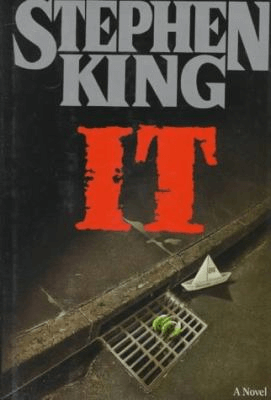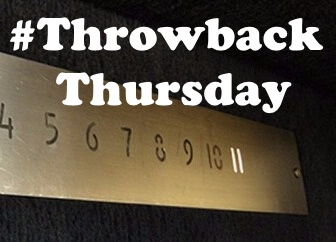Eleventh Stack began publishing content in 2008. That’s nine years of awesome content! We’re highlighting some of our old favorites for Throwback Thursday. Portions of the post “Does Size Matter” originally appeared on November 11, 2015.
Have you guys seen the teaser trailer for the new adaption of Stephen King’s It? Check it out:
Watching that creep-tastic trailer (which broke global traffic records within 24 hours of first being posted) reminded me of how much I loved reading King’s novel, and how much of an effect it had on me.
The novel is a big hulking thing, more weapon than book, that sat on my bookshelf in three different apartments over five years, a towering 1,138-page monolith. It consumed me and took over my subconscious for a several days. I had nightmares about my friends dying pretty regularly while I read it, but on the night I finished it, my dreams were beatific. I didn’t remember specifics upon waking, but I felt at peace. I have to say it’s one of the most complete novels I’ve ever read.

Some of the book’s detractors may say that there’s too much detail about the history of a fictional town, but it made the whole experience feel more real. I wanted to go on adventures with the kids in the book and I wanted to be with them when they finally faced off with It, which I can only describe as mind-bendingly far out. The made-for-television adaptation is really like a trailer for the book. I felt a new kind of accomplishment when I turned the final page, and finishing it endowed me with the confidence that I could start and—more importantly—finish other long books.
(Please note: When I talk about length, I’m talking about number of pages, not number of words, even though number of words is more accurate.)
For years I’ve been putting off reading some long books, like Michael Chabon’s The Amazing Adventures of Kavalier & Clay. For some reason I thought it was around 1,000 pages, but it’s a paltry 639. Ernest Hemingway‘s For Whom the Bell Tolls and John Steinbeck’s East of Eden are practically novellas at barely 500 and 600 pages, respectively. And Moby-Dick? Herman Melville’s classic allegorical tale, which I always thought was much longer (like Kavalier & Clay), comes in at 625. Haruki Murakami‘s 1Q84? That’s closer to It at 925. What about Gone with the Wind? Margaret Mitchell gets even closer at 1,037 pages. War and Peace? Tolstoy’s tome tips the scales at a whopping 1,386 pages.
Some of these look downright scrawny next to It.

It isn’t even King’s longest novel; The Stand holds that honor at 1,153 pages.
There are, of course, plenty of articles and listicles about the longest novels, some of which are in our catalog, like: Joseph and His Brothers (1,207 pages) or The Man Without Qualities (1,774). But does size really matter? I’ve read long books that I strongly disliked, like the 756-page Breaking Dawn (don’t judge—I was in college, trying to impress a girl) right along with short books that I disliked (like The Train from Pittsburgh). Likewise, I’ve read short books that I loved (like the 295-page Me and Earl and the Dying Girl). Regardless, it’s undeniable that with more words—and more pages—authors have more room to create a more detailed world into which you can escape.
And I doubt anyone would bemoan a well-crafted escape.
You’ll float too!
Reserve ItRoss used to work as a Clerk at the Mt. Washington branch of the Carnegie Library of Pittsburgh. He still loves reading books and watching movies, but won’t be rambling about the two as often here anymore.

